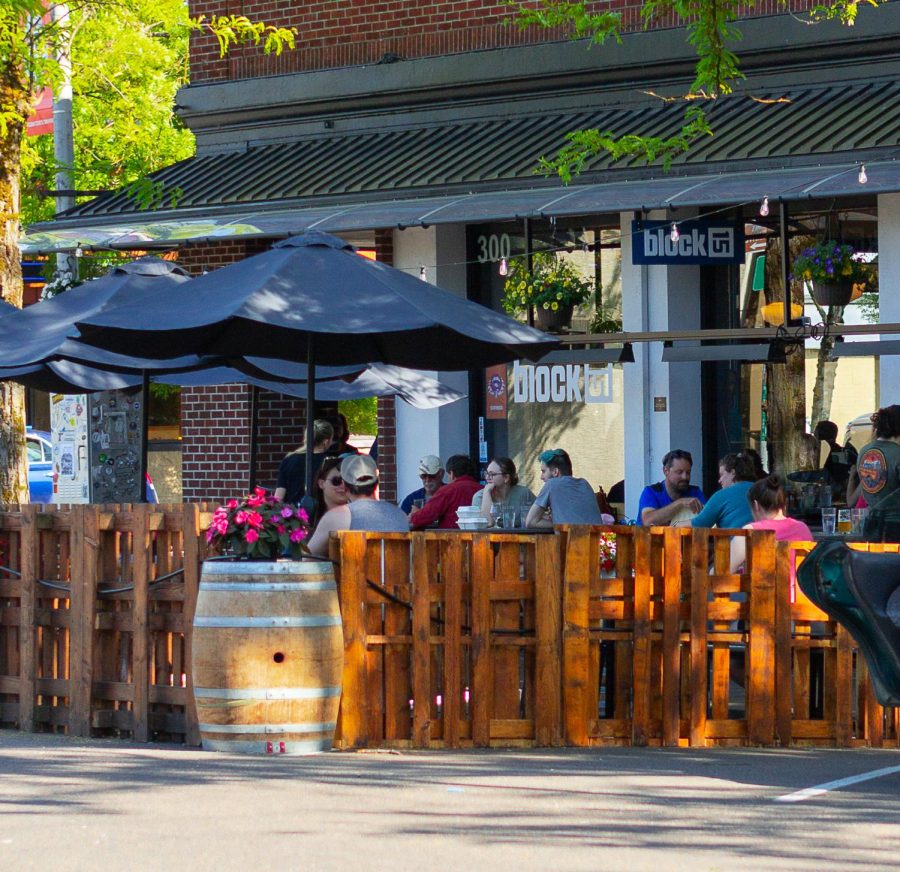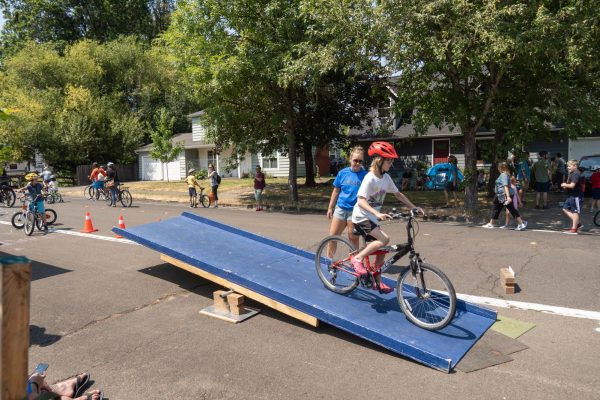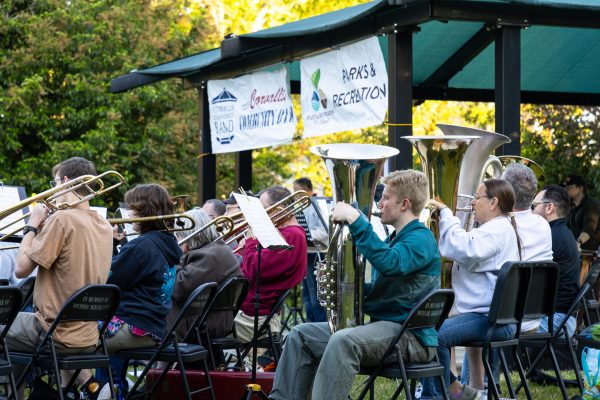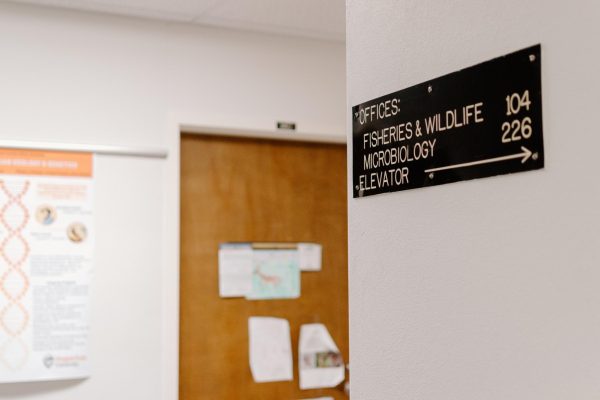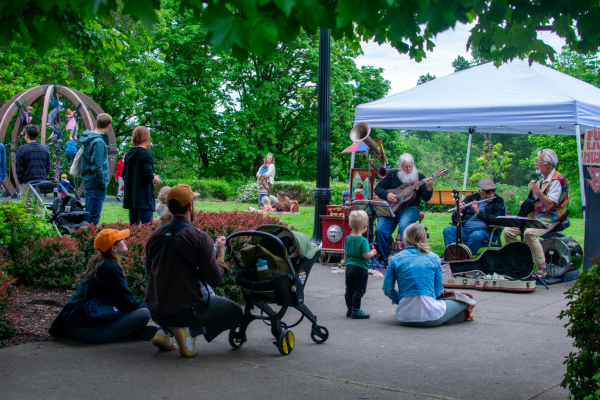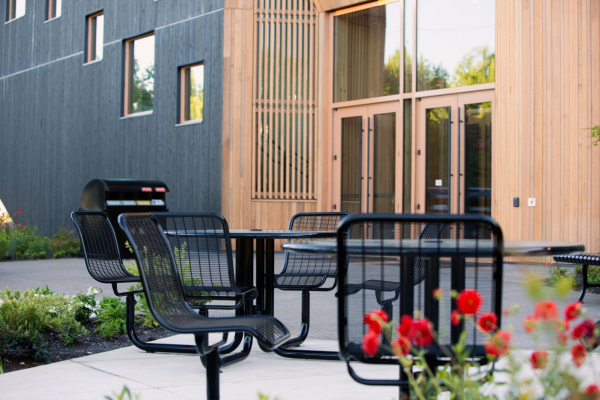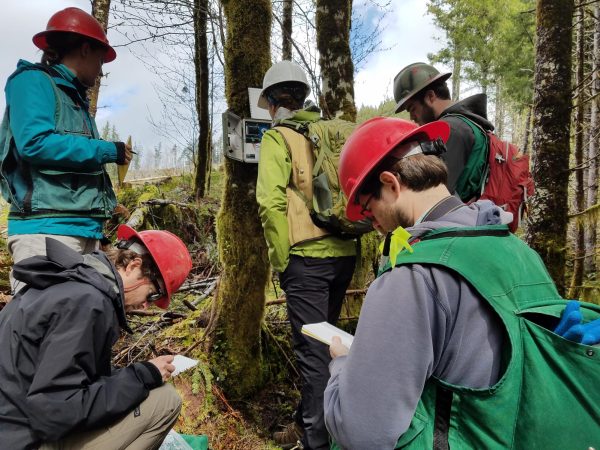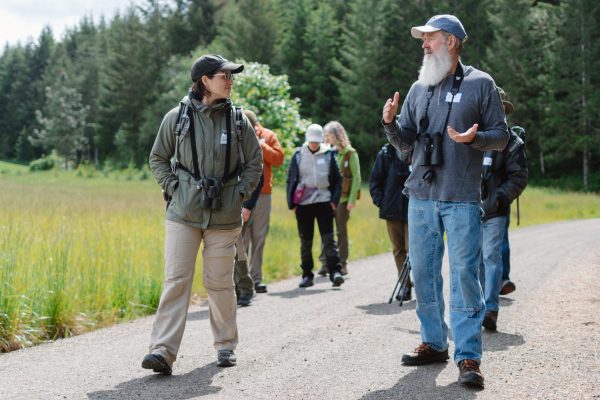Corvallis businesses band together to succeed during the summer: How businesses stay afloat during the summer, through nonprofits and other organizations
Many people attend dinner at Block 15 in downtown Corvallis on May 28.The additional outdoor seating selection was extended out from the sidewalk over a couple of parking spots and is expected to remain in that state over the summer.
June 6, 2023
During the summers in Corvallis, it can be hard to draw customers into a local establishment, with most Oregon State University students at home. To mitigate losses, coalitions between restaurants and businesses use this time to facilitate events, work on infrastructure, and engage in policy design with the city.
With nearly 25,000 Oregon State University students, roughly 40 percent of Corvallis’ overall population departing for home in June, businesses brace for the months to come. Because students make up a tremendous fraction of the workforce in Benton County, their absence represents high rates of turnover among local businesses as well as a need for customers during the summer.
In summers past, struggling with turnover and finding stable employees have been primary goals for hard-pressed businesses.
“A lot of restaurants have to work around student’s schedules in general, but during the summer, a lot of the students leave, and a lot of restaurants go on a … lower staff,” said Steven Richmond, president of the newly formed Greater Corvallis Restaurant Association. With less business, there is less need for a full staff.
Richmond created the Greater Corvallis Restaurant Association in early May to lobby for policy proposals and provide input to city government on the needs of restaurants in the area. The organization is a 501(c)(6) nonprofit. Much of the work that he does is directed towards networking with organizations like Visit Corvallis and other restaurants to ensure that their needs are met.
“Time after time, I heard restaurant owners complaining about the new outdoor seating policies that the city proposed,” he said, referring to the policy that the city requires permits for restaurants to provide outdoor seating in city-owned parking lots. “A lot of the complaints, to the city’s credit, was not because of the city’s fault, but there was a huge lack of communication between the city and the businesses in downtown and on Monroe.”
Richmond will be submitting a policy proposal to the Corvallis City Council to create a year-round outdoor seating program, which will help businesses that cannot afford to install air conditioning.
Other organizations like the Greater Corvallis Restaurant Association have sprung up since the pandemic, championing more streamlined communication between city government and local businesses, which are especially active during the summer.
One such organization is the Corvallis Area Restaurants and Bars Alliance, run by Michele Colomb, who founded it officially in April largely in response to the pandemic. Colomb said she has seen the need for such an alliance to persist beyond the pandemic, however.
“The pandemic itself is, for the most part … on its way out, but then I realized that restaurants were still struggling with sourcing product, retaining employees, overall still struggling financially,” Colomb said. “The CARB Alliance … will focus on promoting, marketing, education, encouraging culinary tourism, event planning, and networking.”
Colomb also oversees the Facebook group Corvallis Culinary Connections, which was created to crowdsource information in a social media platform that was pertinent to COVID guidelines in 2020. Today, it works to help the public and local restaurants to communicate better with information related to hours and events.
Tourism is another industry affected by low residency during the summer. Visit Corvallis, whose main priority is to draw in tourists, has a challenging job during these months.
Christina Rehklau is the executive director of Visit Corvallis. She oversees strategizing and promotion, which entails providing regular events that engage the public and encourages visitors.
“Something we’re thinking about doing is highlighting more happy hours or trying to encourage people maybe to do an activity,” Rehklau said. “For those that … have a lot of student business, I think it is coming up … with an event that might entice a different audience to come during the summer months.”
The summer provides locals with the opportunity to go dine at restaurants and bars that, during any other time of year, would be crowded with students. Although it does not necessarily make up the deficit, it is certainly a sustainable force for local businesses.
As organizing businesses go, the Corvallis Chamber of Commerce has been facilitating events under the leadership of Simon Date for four years, who resigned in May. Date led the chamber through the pandemic and was recently offered a job as the executive director of the Oregon Youth Soccer Association, leaving the chamber under the leadership of Shalena Cardineaux.
“(My) favorite part … (was) getting to know all the … businesses that have become friends over the past four years,” Date said. “It’s an awesome community.”
The chamber under Cardineaux will be lead just the same or better than it has been, according to Date.
This summer should be no different than summers of the past. With business coalitions providing residents with several events that will draw out the public and bolster sales, the success of Corvallis’ vibrant community remains of paramount importance.












































































































